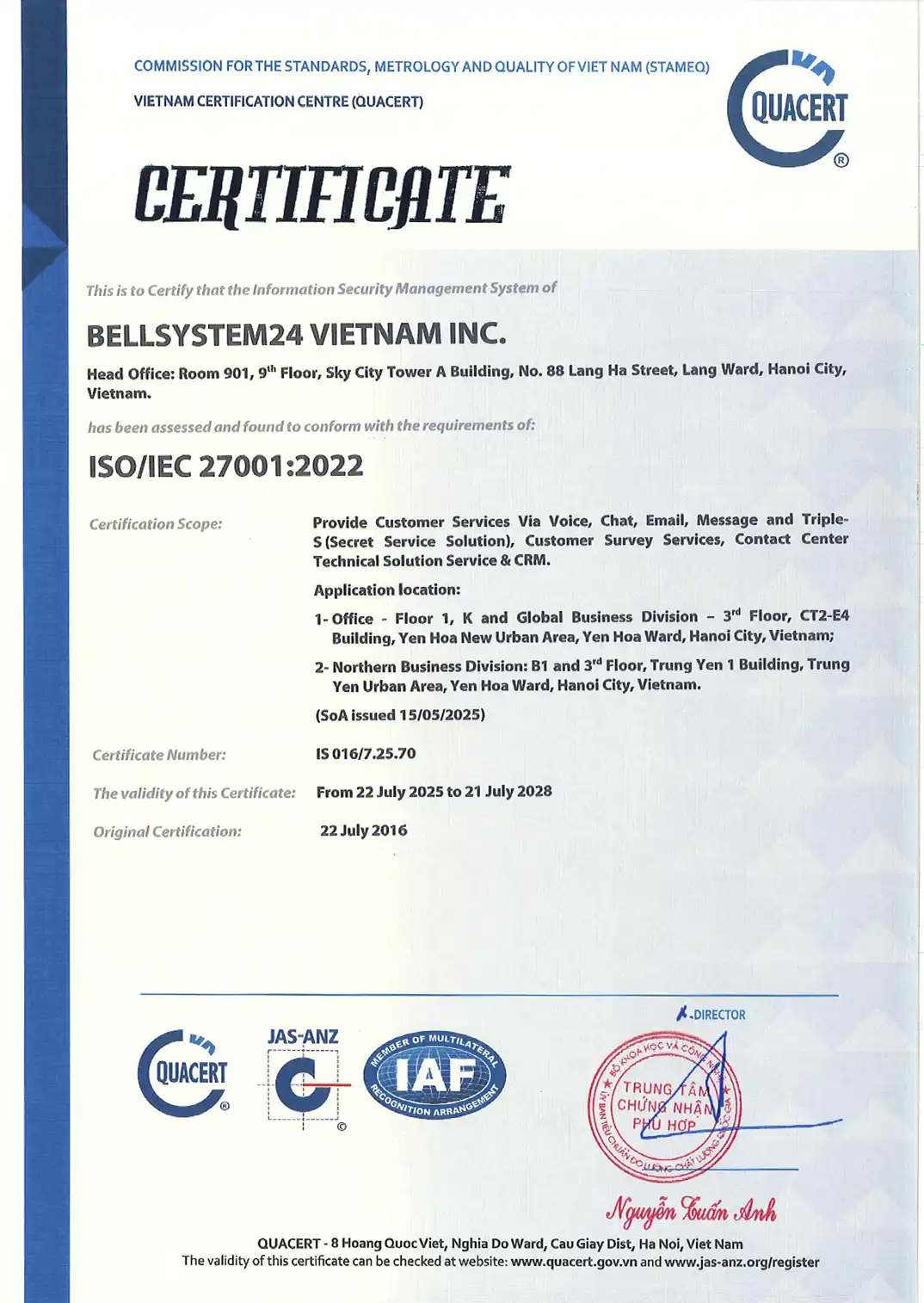A business call center is a modern communication solution that helps optimize the management of calls within and outside the organization. It is an indispensable tool, especially as businesses increasingly focus on customer experience. With a business call center, calls are flexibly distributed to each department, ensuring customers receive prompt and professional support.
According to a report by Gartner, businesses using modern business call centers have increased call handling productivity by 301% and significantly improved customer satisfaction. In addition, integrating the call center system with CRM (Customer Relationship Management) tools helps businesses better capture customer information, thereby enabling them to develop personalized care strategies.
1. Common types of business call centers
Currently, there are three most common types of business phone systems: analog phone systems, VoIP phone systems, and cloud phone systems.
Analog (traditional) switchboard
Analog switchboard, also known as a traditional PBX, uses fixed telephone lines (PSTN) to connect calls. This is a long-standing solution, popular among many small and medium-sized businesses. Although easy to set up, this PBX is often limited in terms of features and scalability.
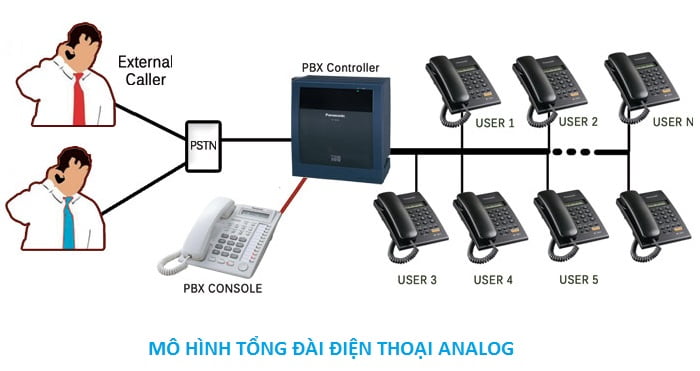
Advantages:
- Easy to install and use.
- High stability, independent of the Internet.
- Low initial investment costs, suitable for businesses that do not require complex features.
Disadvantages:
- Limited scalability, making it difficult to meet long-term development needs.
- Cannot integrate with modern software such as CRM or ERP.
- Call costs are high, especially for interprovincial or international calls.
- Does not support advanced features such as recording, smart routing, or online meetings.
Analog PBX systems are suitable for small businesses with minimal technology requirements or no need for complex communication system integration.
VoIP (Voice over Internet Protocol) switchboard
VoIP (Voice over IP) switchboard Internet-based operations, enabling businesses to minimize international call costs and integrate features such as call recording, call transfer, or remote group meetings.
A VoIP PBX is the ideal choice for businesses seeking to reduce costs and enhance communication efficiency through smart features.
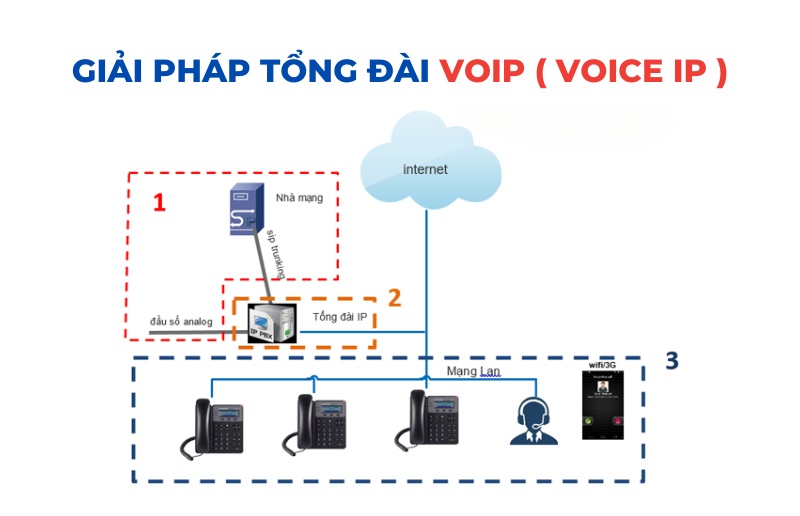
Advantages:
- Cost savings: Internet calls are much cheaper than traditional landline calls, especially international calls.
- Flexible: Easily expand the number of lines as your business grows.
- Modern features: Supports call recording, call forwarding, automatic routing, and online conferencing.
- Easy integration: Connect with CRM, ERP, and other team collaboration tools.
Disadvantages:
- Depends on the quality of the Internet connection. If the network is poor, call quality will be affected.
- You need to invest in initial equipment such as IP phones or specialized software.
- Require an experienced technical team to manage and operate the system.
(Cloud PBX – Cloud) Private Branch Exchange)
Cloud-based PBX is currently the most advanced solution available. This system operates entirely on a cloud platform, eliminating the need for complex infrastructure at the office. Cloud-based PBX is becoming a trend due to its remote management capabilities, lack of need for complex infrastructure investment, and continuous maintenance support. According to research by Global Market Insights, the cloud-based PBX market is expected to reach $15 billion by 2028, reflecting the growing popularity of this solution among global businesses.
Cloud-based call centers are particularly well-suited for modern businesses that frequently work remotely or have multiple branches seeking to optimize communication efficiency.
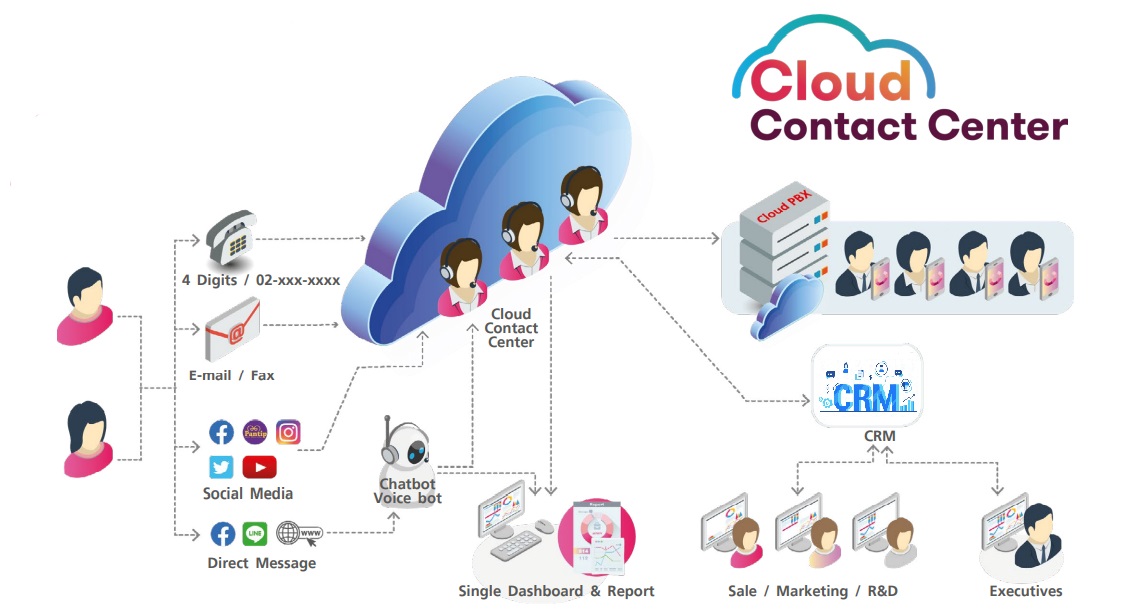
Advantages:
- No infrastructure investment required: All activities are stored and managed on the service provider's servers.
- Easy remote management: Businesses can monitor and operate the system from anywhere, as long as they have an Internet connection.
- Key features: Multi-channel support (chat, email, video), call data analysis, and AI for task automation.
- High flexibility: Easily expand or reduce the number of users according to actual needs.
- Stable maintenance costs: Most providers offer monthly subscription packages, helping businesses easily control costs.
Disadvantages:
- Recurring costs: Although no initial investment is required, businesses must pay monthly maintenance fees, which are typically higher than those for analog switchboards.
- Dependent on the service provider: The quality and stability of the switchboard largely depend on the provider.
- Data security: Since data is stored in the cloud, businesses need to ensure that the provider has robust security measures in place to prevent information leaks.
See also: Implement remote customer care
Overview comparison
| Criteria | Analog Switchboard | VoIP call center | Cloud Call Center |
|---|---|---|---|
| Initial costs | Low | Average | No need for large investments |
| Operating expenses | High | Low | Stable (by service package) |
| Modern features | Restrictions | High | Very high |
| Scalability | Low | High | Very high |
| Internet Dependent | No | Have | Have |
| Suitable for the scale | Small business | Medium and large enterprises | All types of businesses |
2. When should you outsource your business call center?
Outsourcing your business phone system is a great option when you want to focus on your core business without worrying about managing and maintaining your phone system. This is especially helpful for small and medium-sized businesses that don't have the resources to invest in a dedicated IT team. Additionally, for companies with high call volumes or that need to handle calls 24/7, outsourcing ensures the stability and professionalism of the service.
According to a Deloitte report, 591 small and medium-sized enterprises in Asia have chosen to outsource call center services to reduce operational burdens and internal personnel costs.
When businesses should consider outsourcing their business call centers:
When a business lacks technical expertise
For businesses without an in-house IT team or lacking the expertise to set up and manage a call center system, outsourcing is the optimal choice. The provider will handle the entire process, from installation and operation to system maintenance. This not only saves time but also ensures service stability. For example, an e-commerce startup in Vietnam chose to outsource its VoIP call center system to handle over 1,000 customer calls per day during its year-end sales campaign. As a result, they increased their request processing efficiency by 40% compared to their previous self-managed system.
When a business needs to expand rapidly
For growing businesses or those with multiple branches, deploying an internal call center requires significant infrastructure investment and a lengthy implementation period. In contrast, outsourcing allows businesses to expand rapidly without worrying about purchasing additional hardware or hiring more technical staff. A concrete example is ABC Transport Company, which, after opening five new branches in different provinces, chose to outsource its cloud-based call center. This solution enabled them to connect all branches within just two weeks, while reducing operating costs by 30%.
When a business needs to operate 24/7
If a business serves customers across multiple time zones or needs to maintain customer service around the clock, outsourcing call center services is a suitable option. Professional service providers can supply personnel and infrastructure to ensure uninterrupted system operation. A notable example is Lazada, a major e-commerce platform in Southeast Asia. During major shopping events such as "11.11," they partner with call center service providers to ensure they can handle tens of thousands of calls per day without interruption.
See also: 24/7 call center customer service
When a business wants to optimize costs
Outsourcing business call centers often helps save more money than deploying your own system. Businesses don't have to invest in hardware, software, or hire and train technical staff. According to a Statista survey, 481 businesses reported saving an average of 251 annually by outsourcing their call centers, especially cloud-based systems.
3. Considerations when choosing a business phone system
When implementing a business call center, there are several important factors to consider to ensure the system operates effectively. First, businesses need to clearly identify their usage needs, including the number of daily calls, integration requirements with other management software, and the available budget. Additionally, the features of the call center are also factors to consider. A good system should have basic features such as IVR (Interactive Voice Response), call forwarding, and call recording to support service management and quality assessment.
Specifically:
Identify the actual needs of the business
Each business has different scales, fields of operation, and requirements, so accurately assessing actual needs is the first step in choosing a call center.
- Staff size: Businesses need to determine the number of employees who will use the call center system. For small businesses, analog call centers or basic VoIP call center packages may be suitable. Meanwhile, large businesses or those with multiple branches will need cloud call center solutions to support centralized management and easy scalability.
- Daily call volume: If a business handles a large volume of calls, such as a customer service center or telemarketing operation, it needs a system capable of handling multiple calls simultaneously without interruption. According to a Cisco survey, businesses handling more than 1,000 calls per day typically prioritize VoIP or cloud-based systems to ensure speed and stability.
- Integration with other tools: Many businesses need a call center integrated with CRM or ERP to manage customers more effectively. If this is a requirement, modern solutions such as VoIP or cloud-based call centers will be the optimal choice.
Required features
An effective call center is not just a communication tool, but must also support smart features to enhance customer experience and internal efficiency.
- IVR (Interactive Voice Response)This feature allows customers to select options via voice or keypad to be connected to the correct department. For example, an insurance company can use IVR to guide customers to select "Key 1" for consulting services and "Key 2" to report incidents.
- Call forwardingThis is an essential feature to ensure that no calls are missed, especially when employees are not in the office. Modern call centers allow calls to be forwarded to mobile phones or other devices.
- Call recordingRecording not only supports internal training but also serves as important evidence in the event of a dispute. According to a report from a customer service organization, companies that use the recording feature have improved their support quality by up to 25%.
Costs and technical support
Cost and level of technical support are two important factors to consider when choosing a business phone system.
- Initial investment and maintenance costs: Businesses need to calculate the initial setup costs (hardware, software, installation) and monthly or annual maintenance fees. For example, analog PBX systems have low initial costs but incur high operating costs, while cloud PBX systems have monthly maintenance fees but do not require infrastructure investment.
- Warranty and Support Policy: A reputable provider will offer 24/7 support services to ensure stable system operation. According to a Frost & Sullivan survey, 68% businesses that experienced technical issues chose to switch providers due to a lack of timely support. Therefore, when selecting a provider, prioritize those with professional support teams, a commitment to short response times, and clear warranty policies.
4. Review some upcoming trends in business call centers
Business call centers are rapidly developing with the support of modern technology. Artificial Intelligence (AI) will automate tasks such as call routing, data analysis, and providing instant suggestions, helping to increase productivity and improve the customer experience. Multi-channel integration (Omnichannel) will become the standard, allowing businesses to connect all platforms such as email, social media, and chat, creating a more seamless and personalized experience.
In addition, cloud call center will continue to be popular due to its flexibility, rapid scalability, and support for remote work. According to MarketsandMarkets, cloud call centers will grow by 231% annually through 2030. Finally, modern security technology End-to-end encryption and multi-factor authentication will be integrated, ensuring data security in the context of increasing cybersecurity risks.
See all predictions The development trends of business call centers HERE.
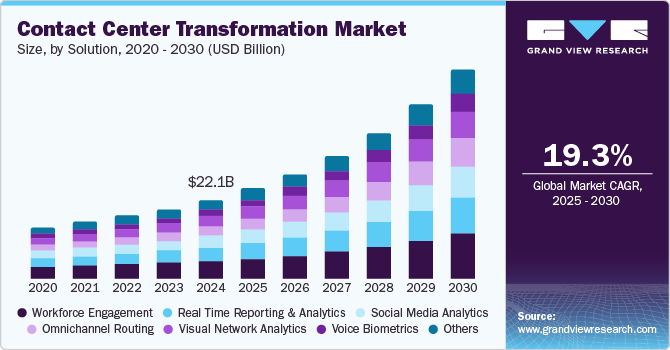
Conclusion
Implementing a business call center not only improves communication efficiency but also builds a professional image in the eyes of customers. Choosing the right type of call center, weighing the pros and cons of in-house implementation versus outsourcing, and keeping up with new technology trends will help businesses optimize the benefits of this system. If you are considering implementing a business call center, contact the experts at Bellsystem24 Vietnam today for advice on the best solution for your organization!






